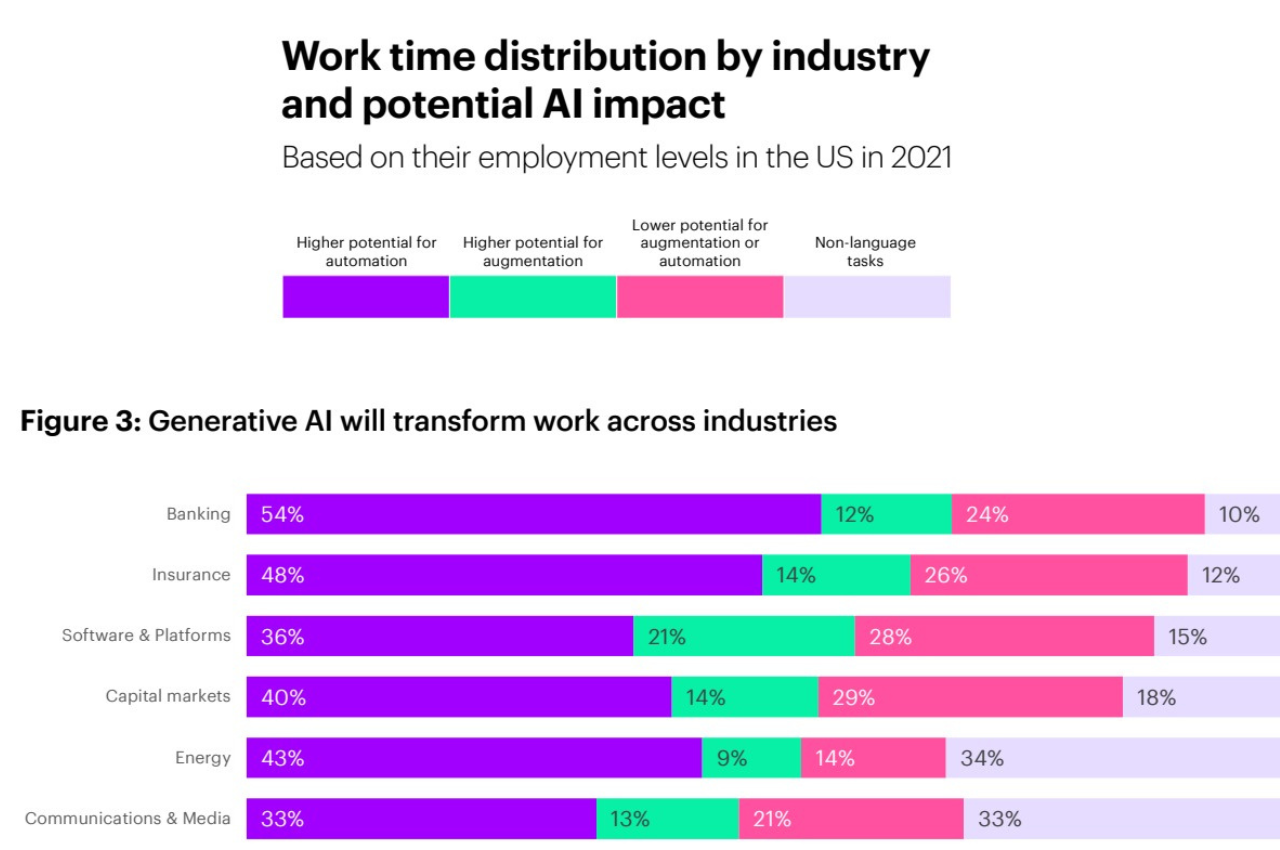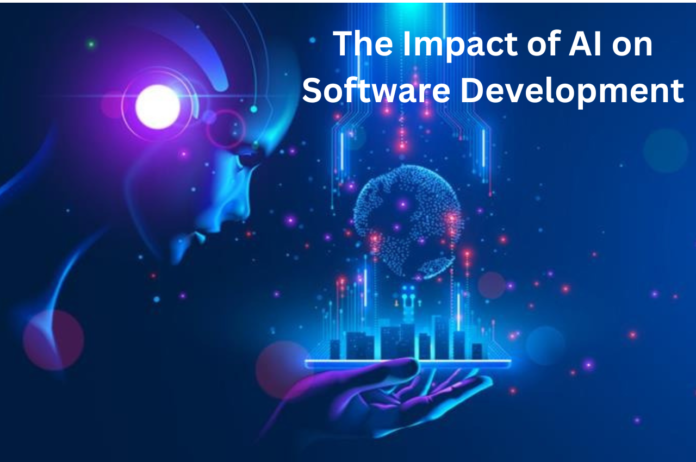AI has significantly changed the landscape of various industries, with software development being one of the most affected areas. The influence of AI in this field is evident in the way software is now created, tested, and managed. In today’s article we will discuss, “Impact of AI on Software Development”. So let’s begin-
Thank you for reading this post, don't forget to subscribe!Predicting the Impact of AI on Software Development
Research studies and market trends suggest a promising future for the use of AI in software development. According to a comprehensive report from Grand View Research, the global artificial intelligence market reached a value of USD 136.55 billion in 2022 and is expected to grow at a compound annual growth rate (CAGR) of 37.3% from 2023 to 2030. Another report by Goldman Sachs highlights the potential of Generative AI, such as GPT, to contribute significantly to the global GDP, with a projected increase of 7% ($7 trillion). Additionally, it could enhance productivity growth by 1.5% and potentially automate over 300 million jobs across the US and Europe that currently rely on manual labor.
 Accenture identifies banking, insurance, and software as the top three industries where Generative AI poses a high risk of automation. Specifically focusing on software and platforms, it is estimated that around 36% of tasks could be automated through Generative AI. Many companies have already recognized the benefits of AI and are actively strategizing on how to leverage its capabilities to reduce human intervention. In a recent report by Bloomberg, Arvind Krishna, the CEO of IBM, revealed that the company is pausing hiring for positions that can be fulfilled by AI. Furthermore, he stated that within the next five years, approximately 30% (7,800) of IBM’s workforce could be easily replaced by automation.
Accenture identifies banking, insurance, and software as the top three industries where Generative AI poses a high risk of automation. Specifically focusing on software and platforms, it is estimated that around 36% of tasks could be automated through Generative AI. Many companies have already recognized the benefits of AI and are actively strategizing on how to leverage its capabilities to reduce human intervention. In a recent report by Bloomberg, Arvind Krishna, the CEO of IBM, revealed that the company is pausing hiring for positions that can be fulfilled by AI. Furthermore, he stated that within the next five years, approximately 30% (7,800) of IBM’s workforce could be easily replaced by automation.
Advantages of AI in Software Development
The utilization of AI techniques in various software development processes is experiencing a surge in the present era. Among the popular domains where AI applications are employed is automated code generation. Notable examples of AI applications include Amazon CodeWhisperer and Github Copilot. Drawing from articles such as “Deepcoder: learning to write programs” and “code2seq: Generating Sequences from Structured Representations of Code,” it can be inferred that researchers have devised approaches wherein AI models can generate code fragments, complete functions, or even entire programs based on predefined rules and patterns. This not only enhances productivity but also reduces human error rates and repetitive coding tasks.
According to an article in the Harvard Business Review, AI-powered testing and debugging are crucial components that can automatically detect errors, identify efficiency bottlenecks, and offer improvements through the use of machine learning techniques. AI can automate the generation of test cases, enabling developers to enhance code coverage and elevate the quality of their products.
Furthermore, AI has revolutionized the fields of documentation and natural language processing (NLP). Large language models have made remarkable advancements in generating human-like language, assisting programmers in crafting detailed documentation, code comments, and even context-aware code completions.
Here are some crucial areas where AI is anticipated to advance significantly
AI is set to revolutionize the field of software development in the future. With the help of intelligent software assistants, tasks like refactoring, real-time advice, and code development will be automated. Additionally, automated software maintenance will identify security vulnerabilities and suggest appropriate patches. Intelligent code review solutions will enhance collaboration among developers. Moreover, AI models will continuously gather new insights from code sources, providing the latest best practices and optimizations. Ultimately, AI will significantly enhance productivity, efficiency, and collaboration in software development.
Academic Researches
Lubna Mahmoud Abu Zohair’s study, titled “The future of software engineering by 2050s: Will AI replace software engineers?”, envisions several potential best practices in software engineering. These practices include designing software systems at a higher level of abstraction using a model-driven approach, writing code with the assistance of self-verifying and self-testing pre-existing programs, and maintaining agility to meet user requirements. It is anticipated that these procedures will be implemented by 2050. Abu Zohair also suggests that artificial intelligence will automate a majority of the stages in the software development lifecycle framework, such as requirements gathering, design, coding, testing, and maintenance. This automation will result in reduced time and cost for software development. However, one challenge that needs to be addressed is the potential uncontrollability of AI systems.
In another article published in the Harvard Business Review, titled “Collaborative Intelligence: Humans and AI are Joining Forces,” it was found that companies achieve the most significant performance improvements when humans and machines work together through collaborative intelligence. This means that businesses can use automation to complement, rather than fully replace, the abilities of their employees. For example, an AI-powered chatbot can assist customer care agents by handling routine questions, allowing the agents to focus on more complex issues.
Disadvantages of AI
According to a McKinsey article, while AI offers numerous benefits, it also has significant drawbacks that require serious attention. AI systems, due to their reliance on vast amounts of data, often lack creativity and intuition. Although artificial intelligence algorithms excel at pattern recognition and data analysis, they struggle with thinking outside the box and generating innovative solutions. Human engineers possess a unique ability to approach problems from multiple perspectives, consider context, and develop solutions that AI systems may find challenging to replicate. They also possess a broader understanding of software development, including user requirements and business objectives. Additionally, over-reliance on AI systems can lead to potential technical issues and system failures. Furthermore, ethical concerns arise when AI-driven software development is susceptible to bias or social discrimination. Apart from these issues, AI’s deficiency in human interaction skills, empathy, and understanding of user needs can result in unsatisfactory user experiences.
Conclusion
The advancement of AI in the past and present has demonstrated its potential to revolutionize the software development industry. AI is reshaping the process of developing, testing, and maintaining software by automating mundane tasks, enhancing developer capabilities, and enabling more efficient collaboration. With the integration of intelligent assistants, automated maintenance, improved teamwork, and continuous learning, the future of AI in software development appears highly promising. By embracing these advancements, developers will have the necessary tools to create innovative, high-quality software at a faster pace. While there is a possibility that businesses may utilize AI to replace human workers, it is crucial to highlight that those companies that combine AI with human intelligence will thrive. Conversely, if a company solely relies on AI, its progress will likely be short-lived.
Technocommy is a connecting space, the leading growth and networking organization for business owners and leaders. Do I qualify?


